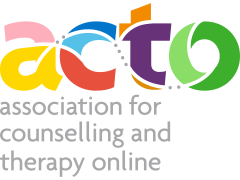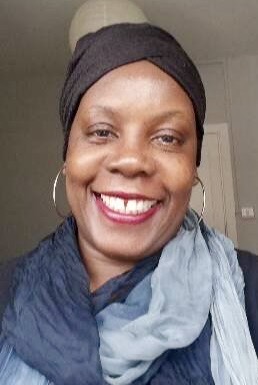New ACTO Chair and accredited integrative CYP therapist Basi Amodu shares the motivations behind her career choices and priorities for the organisation
Basi Amodu did not initially set out to be a therapist.
During the early stages of her career, Basi had a number of differing jobs before becoming a mother, ranging from location and reportage work in Cuba and South Africa to working in the property management industry. Then when she became a mother and decided to work within her local community in a local library, she successfully applied for a role at a school as a Home School Coordinator – a bridge between, home, school and Children’s Services. This proved to be a seminal moment. Assigned to working with families impacted by alcohol, substance misuse, mental health and domestic abuse, Basi could see how positive changes in the family environment were less significant for the smallest children in those families. Basi’s sole mission became how to make systemic changes using the statutory bodies that would benefit the children, young people, and their families to help them have the best possible start in life. In conjunction with this, Basi also became the Project Coordinator for the Young Carer’s Service in area of West London. This fostered Basi’ ambition to work garner more support from the statutory bodies that had the resources to effect real change in the lives of young people and their families.
Building the foundations for a career in counselling and therapy
Much of Basi’s work involved working with families impacted by mental health, substance/alcohol, and domestic abuse – often referred to as the ‘toxic trio.’ Although Basi enjoyed the work, she realised that to help get the families more financial and practical support, she needed a new form of language and additional skills to advocate on behalf of her clients.
A chance conversation with a colleague pointed Basi in the direction of a new foundation course in counselling children which encouraged her to apply. In due course, Basi not only completed the foundation course but went on to study for a postgraduate diploma in counselling and immediately after the master’s degree in counselling at the University of East London.
Basi explained:
“Domestic violence funding was being stopped and I realised that I wanted to focus more on children and young people. By developing my therapy work, therapeutic skills and drawing on my experience and background, I could assist more disenfranchised children and families, ensuring that they received the crucial early intervention they required.”
“Children are not as afraid of change as adults are.”
Developing strategies for coping with change in our lives can be a challenge for all age groups. One of the reasons why Basi finds it rewarding to work with younger age groups is her belief that children and young people are more willing to take positive risks – and are arguably not as afraid of change as adults are.
Basi said:
“Children and young people know that when we meet for a therapeutic counselling session, they are coming into a space to talk about difficult things. I use my creative and listening skills, to provide a safe space that allows young people to challenge their lived experiences, offers them the opportunity to explore and express themselves without judging them. These methods help children to find the answers to the questions they are struggling with themselves.
“I find it incredibly rewarding to accompany young people on their journey – even if I may not see the eventual positive changes in their lives in the future.”
It is not only working with children and young people that Basi finds fulfilling professionally. Helping parents to deal with challenges in their lives is equally satisfying, for example working with parents to understand their parental struggles often stem from a space of fear (not wanting to repeat mistakes) and love for their child. Supporting parents to explore their role not just as parents but also as people in their own right. One way of doing this is to offer space for parents to understand their own school and childhood experiences. For Basi, it is important that this process is a collaborative one without personal judgement.
The transition to working online.
The advent of the COVID-19 pandemic resulted in therapists and counsellors moving their practices online as lockdown restrictions were enforced during 2020/1. For some therapists this represented a major challenge, getting to grips with technology and seeking to offer clients a comparable experience to that of a face-to-face session. Yet not for Basi.
Basi had already gained online experience using Skype to work with younger clients who had were now at university and wished to continue their sessions virtually without having to find another therapist.
This experience encouraged Basi to further research the benefits of working online, for example in countries like South Africa, Ethiopia and Canada had been using ‘Telehealth’ before the pandemic as a lifeline for many in remote communities. Many of Basi’s clients viewed online working as a backup; not perfect or a long-term solution, but one which could work for some of her clients.
In March 2020 the pandemic hit whilst Basi was working privately and within a digital school. Due to having family in Europe Basi was able to prepare her private clients for the transition to online working, sharing creative resources, coaching families with using Zoom and other platforms, and re contracting the work. The clients were practising using the video and live chat platforms in the months leading up to the first UK restrictions. The transition to working online was rapid but Basi was prepared as were her clients. Once the UK government shut the country down the new service launched within 24 hours.
Basi said:
“This period was incredibly intense. I was working with a full cohort of students, and we knew that restrictions to face-to-face contacts were imminent.
“We were thoroughly prepared though, providing briefings for parents, and explaining how it would work. The result was that it was a seamless experience for our young clients. That’s not to say that it did not have its own challenges; and like many thousands of therapists and counsellors, we were training as we were delivering!”
Working online has therefore been an extremely positive experience for Basi, so much so that although she continues to work in person in school, her private practice and clinical supervision work is online only.
Addressing the concerns of practitioners on working online
Basi understands the unease that some practitioners feel about working online. She explained:
“I appreciate that some therapists and counsellors are uncomfortable about working online. They have concerns about their abilities to pick up non-verbal clues from their clients, they feel that it is difficult to maintain the same connections – and perhaps believe that online is not appropriate for dealing with specific issues. I am aware too that some professional bodies have a view that it is not possible to work with certain cohorts, for example clients under 11 years of age. Furthermore, some individuals are not confident about working with the technology and feel limited by it.
“These are all legitimate concerns – which as an organisation supporting online practitioners we need to be fully understanding of. Nonetheless, there are many reasons to be excited about the benefits of working online.”
In Basi’s opinion demonstrating how practitioners can work with different traumas and issues is key to convincing those who are either sceptical or have yet to try working online:
“Working online is not an emergency system; it is another way of working which can offer many different ways, and tools, for you to work with clients.
“There are several therapists who are using technology in innovative and exciting ways to work with children and young people, such as Lesley Simpson-Gray, Jessica Stone and Ellie Finch.
“By working online, we do not only expand our reach, but we also expand our skills and our competencies – ultimately offering more choice to our clients.”
These experiences convince Basi that online working has increased her creativity, boosted her confidence, expanded her contacts – and helped her to work with clients who find the in-person sessions daunting due to concerns about body image or for reasons of disability or accessibility. Where appropriate, Basi can work without a camera and use Live Chat to communicate.
Working online internationally does though have other important considerations.
Basi is an Associate Member of the Barbados Society of Psychology and understands how legal systems can differ in countries across the world. This makes it crucial to be mindful of client safety, as the laws and regulations governing a territory could be very different to the UK. In addition, it is essential to undertake the necessary training and groundwork to ensure that as a therapist or counsellor, we have the appropriate set of competencies to help a client overseas.
The future of ACTO
This year saw Basi elected as the new Chair of ACTO in succession to Adrian Rhodes.
Basi explained that it although she did not put herself forward to do it, it is a role that she is now relishing – and is keen to make sure that ACTO focuses on delivering more benefits to its members. She explained:
“When I agreed to be Chair, I was clear that I was not just a director but a member, too. This means that it is important that we increase the services and benefits we provide to our members, whether they are students, professionally qualified or in supervisory roles.
“That is why I have a number of priorities for the coming year and beyond.
“Firstly, we need to incorporate our training providers more closely within ACTO, helping members and potential members to access the professional training they need.
“Secondly, we want to grow our membership – and this requires us to be seen as the leading body in the UK for online digital working; driving up standards and showcasing innovation which benefits our clients. This also necessitates that we understand that as newer members qualify, they may have different needs from those who have worked online for many years. We must change and adapt.
“And finally, we must be ambitious. I feel that one of ACTO’s long-term aims should be to be regulated by the Professional Standards Authority. This would give both members and clients greater protection and more confidence about our status. It is likely to involve significant work – but for me, it represents a real opportunity to grow and professionalise the organisation.”
Basi Amodu was talking to Simon Frost
————————————————-
About Basi Amodu
Basi is a MBACP (Accred) of the BACP and an Associate Member of the BSP (Barbados Society of Psychology) and Chair of ACTO. She is an integrative creative therapist in schools and private practice working with children, young people (CYP) and adults. Basi also works as a clinical supervisor working with therapists and other experts in the helping professions. For further information about Basi please click here.
ACTO conference 2023
ACTO is hosting its next annual conference on 4 November 2023. More information will be available on the news and events pages soon.


